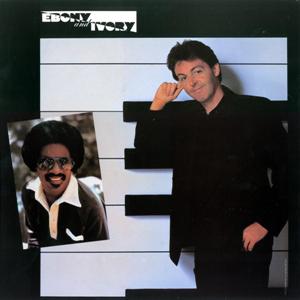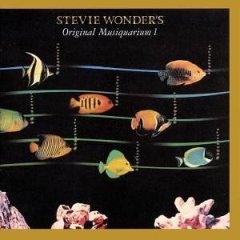
"Crazy Little Thing Called Love" is a song by the British rock band Queen. Written by Freddie Mercury in 1979, the track is included on their 1980 album The Game, and also appears on the band's compilation album Greatest Hits in 1981. The song peaked at number two in the UK Singles Chart in 1979 and became the group's first number-one single on the Billboard Hot 100 in the US in 1980, remaining there for four consecutive weeks. It topped the Australian ARIA Charts for seven weeks. It was the band's final single release of the 1970s.

"Sir Duke" is a song composed and performed by Stevie Wonder from his 1976 album Songs in the Key of Life. Released as a single in 1977, the track topped the U.S. Billboard Hot 100 and Black Singles charts, and reached number two in the UK Singles Chart, his joint biggest hit there at the time. Billboard ranked it as the No. 18 song of 1977.
"That's What Friends Are For" is a song written by Burt Bacharach and Carole Bayer Sager.

"I Knew You Were Waiting (For Me)" is a song released by American singer Aretha Franklin and English singer George Michael as a duet in 1987. The song was a number one hit in the United States and the United Kingdom. Billboard listed "I Knew You Were Waiting (For Me)" as Franklin's all-time biggest Hot 100 single. The song was Franklin's biggest hit on the Billboard Adult Contemporary chart, reaching number two. The song was written by Simon Climie and Dennis Morgan and produced by Narada Michael Walden. Franklin and Michael won a 1987 Grammy Award for Best R&B Performance by a Duo or Group with Vocal for "I Knew You Were Waiting (For Me)".

"Ebony and Ivory" is a song that was released in 1982 as a single by Paul McCartney featuring Stevie Wonder. It was issued on 29 March that year as the lead single from McCartney's third solo album, Tug of War (1982). Written by McCartney, the song aligns the black and white keys of a piano keyboard with the theme of racial harmony. The single reached number one on both the UK and the US charts and was among the top-selling singles of 1982 in the US. During the apartheid era, the South African Broadcasting Corporation banned the song after Wonder dedicated his 1984 Academy Award for Best Original Song to Nelson Mandela.

American musician Stevie Wonder has released 23 studio albums, three soundtrack albums, four live albums, 11 compilations, one box set, and 91 singles. His first album, The Jazz Soul of Little Stevie, was released in 1962 when he was 12 years old, and his most recent, A Time to Love, was released in 2005.

"I Was Made to Love Her" is a soul music song recorded by American musician Stevie Wonder for Motown's Tamla label in 1967. The song was written by Wonder, his mother Lula Mae Hardaway, Sylvia Moy, and producer Henry Cosby and included on Wonder's 1967 album I Was Made to Love Her.

"Because I Love You (The Postman Song)" (or simply titled "Because I Love You") is a song written by Warren Allen Brooks and performed by American singer, songwriter, and record producer Stevie B. It was released in September 1990 by LMR and RCA from his third album, Love & Emotion (1990). The song peaked at number one on the US Billboard Hot 100 chart in December 1990 and remained there for four consecutive weeks. It also spent two weeks at number one on the Billboard Adult Contemporary chart. The song reached the top 10 in several countries worldwide, including Belgium and the Netherlands, where it peaked at number two. It received a gold certification in Australia and the United States. In August 2018, Billboard ranked the song the 71st-biggest hit in the history of the Hot 100.

"Ghostbusters" is a song written by American musician Ray Parker Jr. as the theme to the 1984 film Ghostbusters, and included on its soundtrack. Debuting at number 68 on June 16, 1984, the song peaked at No. 1 on the Billboard Hot 100 on August 11, staying there for three weeks, and at No. 2 on the UK Singles Chart on September 16, staying there for three weeks. The song reentered the UK Top 75 on November 2, 2008 at No. 49 and again on November 5, 2021, at No. 38.

"Signed, Sealed, Delivered " is a soul song, by American musician Stevie Wonder, released in June 1970 as a single on Motown's Tamla label. It spent six weeks at number one on the U.S. R&B chart and peaked at number three on the U.S. Pop chart. In the same year, the song was also released on the album Signed, Sealed & Delivered.

"Part-Time Lover" is a song by American R&B singer and songwriter Stevie Wonder, released as the first single from his twentieth studio album, In Square Circle (1985). The song reached number one on the Billboard Hot 100, R&B, dance, and adult contemporary charts, becoming Wonder's final number one hit to date. The song's simultaneous chart successes made Wonder the first artist to score a number-one hit on four different Billboard charts. The song was also released as a special 12" version. Lyrically, it tells the story of a man who is cheating on his wife with a mistress, only to find out in the end that his wife is cheating on him as well.

The Woman in Red: Original Motion Picture Soundtrack is the second soundtrack album released by American musician Stevie Wonder on the Motown label. Also featuring Dionne Warwick, the album was released in 1984 for the film of the same name. It features Wonder's biggest hit, "I Just Called to Say I Love You", which hit number one internationally and won the Academy Award for Best Original Song, and also features the follow-up hit, "Love Light in Flight" and "Don't Drive Drunk", the song and the accompanying music video for which were used in the Ad Council and the US Department of Transportation's Drunk Driving Prevention public service announcement the following year.

Stevie Wonder's Original Musiquarium I is a compilation album by R&B/soul musician Stevie Wonder that was released in 1982 by Tamla Records. It collects eleven Top 40 hit singles and five album tracks, including four previously unreleased tracks, from 1972 to 1982. The album peaked at No. 4 on the Billboard 200, at No. 1 on the Top R&B Albums chart in the U.S., and went to No. 8 in the UK. It has been certified gold by the RIAA. The four new songs were issued as singles to promote the album, with "That Girl" and "Do I Do" reaching the top 10 and top 20 of the US pop chart and number one and two on the R&B chart, respectively.

"I Guess That's Why They Call It the Blues" is a song by English musician Elton John, with music by John and Davey Johnstone and lyrics by Bernie Taupin, released as the first single from John's 17th studio album Too Low for Zero. It was the first single since 1975's "Someone Saved My Life Tonight" to feature the classic lineup of the Elton John Band.

"Big Love" is a song written by Lindsey Buckingham and performed by British-American rock band Fleetwood Mac. The song first appeared on the band's 1987 album Tango in the Night. The song was the first single to be released from the album, reaching number 5 in the US and number nine in the UK. The single was also a hit on the American dance charts, where the song peaked at number 7.

"For Your Love" is a song written and performed by American musician Stevie Wonder, released in February 1995 by Motown as the first single from his 22nd album, Conversation Peace (1995). It won two Grammy awards for Best R&B Male Vocal Performance and Best R&B Song at the 38th Grammy Awards.

"I Don't Know Why" is a song by American singer-songwriter Stevie Wonder, from the 1968 album For Once in My Life. It was released as a single on January 28, 1969, with "My Cherie Amour" on the B-side. A few months later, the single was re-issued with sides reversed because of the growing popularity of "My Cherie Amour", which became a Top Ten hit.

"I Ain't Gonna Stand for It" is the second single from Stevie Wonder's 1980 album, Hotter Than July. It reached number four on the Billboard R&B singles chart and number 11 on the Hot 100. It also hit number 10 on the UK Singles Chart. The song is famous for Wonder's imitation of a seasoned country-and-western crooner and his inspiring drumming. Charlie and Ronnie Wilson of The Gap Band provide backing vocals on the song. It was covered by Eric Clapton in 2001.

"Love Light in Flight" is a song written, produced, and performed by American R&B singer-songwriter Stevie Wonder. It was released in 1984, from The Woman in Red soundtrack. It peaked at number 4 on Billboard Black Singles, number 1 on the RPM Adult Contemporary chart, and number 17 on the Billboard Hot 100 for February 2, 1985.

"My Love" is a song performed by Spanish singer/songwriter Julio Iglesias, written by and featuring American musician Stevie Wonder. It was released as a single in 1988 from Iglesias' album, Non Stop. The duet was a top 5 hit in the UK and Ireland, reaching numbers 5 and 2, respectively. In the U.S., it reached No. 80 on the Billboard Hot 100, and No. 14 on the Adult Contemporary chart.




















